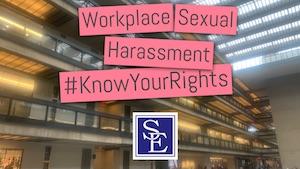OF DISCRIMINATION AND HARASSMENT
Should I Inform My Employer that I am Being Sexually Harassed by a Co-Worker?

It is always advisable to alert an employer about being subjected to unwelcomed sexual harassment, particularly if you want the sexual harassment to stop, it is. There could be several different people working for an employer to whom complaints of sexual harassment should be made. The employer may designate an employee, position and/or department as the appropriate recipient of any complaint that would trigger an investigation. Typically, anti-discrimination and sexual harassment policies contained in an employee manual or handbook will identify immediate supervisors, department heads and/or human resource representatives as persons to inform of the sexually harassing conduct or behavior. It is advisable to review the employer’s anti-discrimination and sexual harassment policy when determining who to alert of the complaint of sexual harassment.
New Jersey employers have a legal obligation to have effective an anti-discrimination and sexual harassment policies in place that address incidents of sexual harassment. An effective anti-discrimination and sexual harassment policy should stop, prevent and remediate sexually harassing conduct that creates a hostile work environment for its employees and other invitees. Such policies should include an obligation of both supervisors and employees to inform the employer of conduct that they believe may violate the policy when they become aware of it. When an employer is placed on actual notice of behavior or conduct that may violate the employer’s anti-discrimination and sexual harassment policy, they are legally obligated to conduct a prompt, complete and thorough investigation into the possible policy violation. An employer who fails to conduct a prompt, thorough and complete investigation of a reasonable and good faith complaint of sexual harassment can be held legally responsible for sexual harassment and retaliation.
An effective anti-discrimination and sexual harassment policy should make clear that the employer will never retaliate against anyone for making a complaint or participating in a complaint investigation. Anyone who complains of sexual harassment or participates in a harassment investigation is cannot be retaliated against by the employer for engaging in the protected activity. If an employer takes adverse employment action against an employee for making a good faith and reasonable complaint of sexual harassment or serves as a witness in a harassment investigation, that employer can be held legally responsible for the harm caused to the employee, including loss of pay, emotional distress and other damages. A clear and unequivocal statement of anti-retaliation is an essential part of an effective policy.
There can be a significant legal downside for an employee who fails to inform the employer of the sexual harassment and does not suffer any tangible employment action. In situations in which an employee is sexually harassed at work but does not suffer a tangible employment action, an employer can present an affirmative defense to a legal claim of sexual harassment that could relieve it from having any legal responsibility for the workplace sexual harassment. In these situations, an employer must prove that: (1) they have effective an anti-discrimination policy in place and (2) the complainant of the sexually harassing conduct failed to avail themselves to the anti-discrimination policy in place. For example, an employee who is being subjected to sexual harassment who does not alert her supervisor, HR representative or other designated person, and the employer proves that if she had, they would have taken immediate and effective action to stop and remediate the sexual harassment, any potential employment claim would be impacted.
It also always advisable for an employee to immediate reach out to an experienced employment attorney who can inform of their rights and responsibilities under New Jersey sexual harassment laws. Sexual harassment laws are complicated, and victims of sexual harassment do not have to go through the complaint investigation without support.





